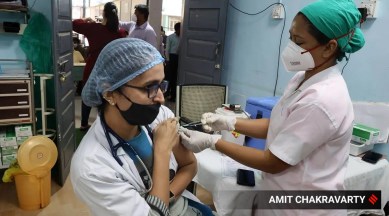📣 For more lifestyle news, click here to join our WhatsApp Channel and also follow us on Instagram
Covid-19: Should you take a second precautionary or booster dose?
Reports suggest health practitioners urge for second booster or precautionary dose in a Covid-19 meeting with Mandaviya; is it required?

A Covid-19 preparedness meeting of Union Health Minister Dr Mansukh Mandaviya with representatives of the Indian Medical Association (IMA) and other top doctors and public health, has reportedly urged the government to allow people, especially frontline workers, to take their second coronavirus booster doses.
The video conference meeting came against the backdrop of rising cases globally, especially in China, Japan, South Korea, and Thailand.
Dr Mandaviya also took to Twitter to share about the meeting. “Today, interacted with about 100 public health experts and clinicians from across the country regarding Covid-19 management,” he said.
Though there is yet to be an official comment from authorities on a second precautionary dose, pediatrician Naveen Thacker, President Elect International Pediatric Association, took to Twitter and wrote, “No panic but prepare well”.
Notably, booster or precautionary dose is an additional dose administered to a vaccinated population that has completed a primary vaccination series. The objective of a booster shot is to restore vaccine effectiveness, which is no longer sufficient with the evolving Covid variants, said Dr A M Deshmukh, president of Microbiologist Society in an earlier interaction with indianexpress.com.
So, is a second booster or precautionary dose required?
According to Dr Subhendu Mohanty, interventional cardiologist, Sharda Hospital, Noida, “an infection gives better immunity than a vaccine”.
“All of us got two dose of vaccines. Now whether you agree or not, most of us have got Covid-19 during the Delta or the Omicron wave. Covid has since been endemic in our population, meaning it is likely continuously infecting those still not immune to it. So where is the justification for another booster?” he asked.
Negating the need for a second booster for frontline or healthcare workers, Dr Mohanty said, “Most of them, like me, have got Covid-19 twice, and two doses of vaccines. Majority, among my peers, have not taken even the first booster if they had two infections. And that’s a scientific decision. However, if somebody is sure that they never contracted Covid-19 and have only taken vaccines, it makes sense in taking a booster,” Dr Mohanty told indianexpress.com.
However, Dr Arunesh Kumar, HOD, department of pulmonology and respiratory medicine, Paras Hospitals, and Gurugram mentioned that the “misunderstanding, uncertainty, and lack of awareness of the advantages of booster doses” stems from the fact that people were told that “a complete immunisation required two doses”. “People may be more willing to take a booster dosage after receiving counseling on the benefits of doing so. Every six months, we advise patients to take a booster dosage. Every six months, I personally take a booster dosage since new infections might arise with new variants. Although there has not yet been a spike in demand for booster dosage, there is always a need for a booster dose in general,” he told indianexpress.com.
Is a booster dose needed for all?
While the need may be debated as a “contentious recommendation”, Dr Ravindra Mehta, senior pulmonologist, Apollo Hospitals, Bangalore mentioned that experts in the West who have studied Covid-19 and vaccine efficacy, have taken a stand that at six months after injection, the immunity wanes and makes people more vulnerable to infection. “The good news is that even after six months, moderate to severe infection requiring hospitalisation is unlikely in healthy individuals. The vaccine efficacy against the new variants like B5.7, and XBB is not very clear too,” Dr Mehta said stressing for attention on specialised groups who may be more vulnerable.
Dr Shuchin Bajaj, founder director, Ujala Cygnus group of Hospitals, also added that high-risk individuals should consider the second booster or fourth dose.
If the third dose or precautionary dose has been taken more than six months ago, people with co-morbidities, elderly, or those who are immuno-compromised, or those who are exposed to high-risk cases on a daily basis like frontline workers, should take the fourth dose, he urged. “Now, as the nasal vaccine has come about — which is considered extremely safe and helps provide local immunity — we should definitely consider it,” said Dr Bajaj.
Which vaccine to be given as a second booster?
Dr Mohanty shared that all elderly people above age 65 years should preferably be given a booster dose of covaxin.
The booster dose by health workers was taken nearly one year back much before the general public, recalled Dr P Venkata Krishnan, internal medicine, Artemis Hospital, Gurgaon. He added that the new variant that is floating around is not greatly protected by the earlier vaccines which are available. “Given such circumstances, the second booster shot is unlikely to be beneficial unless it is of a different kind than the ones in the first three doses. If there is an impending epidemic, health workers need to be protected to take care of the patients. But which vaccine is to be given, which is more safer as a second booster, and more efficient against Omicron variants, has to be properly researched and then only booster shots allowed to be taken,” said Dr Krishnan.
📣 For more lifestyle news, follow us on Instagram | Twitter | Facebook and don’t miss out on the latest updates!
📣 For more lifestyle news, click here to join our WhatsApp Channel and also follow us on Instagram